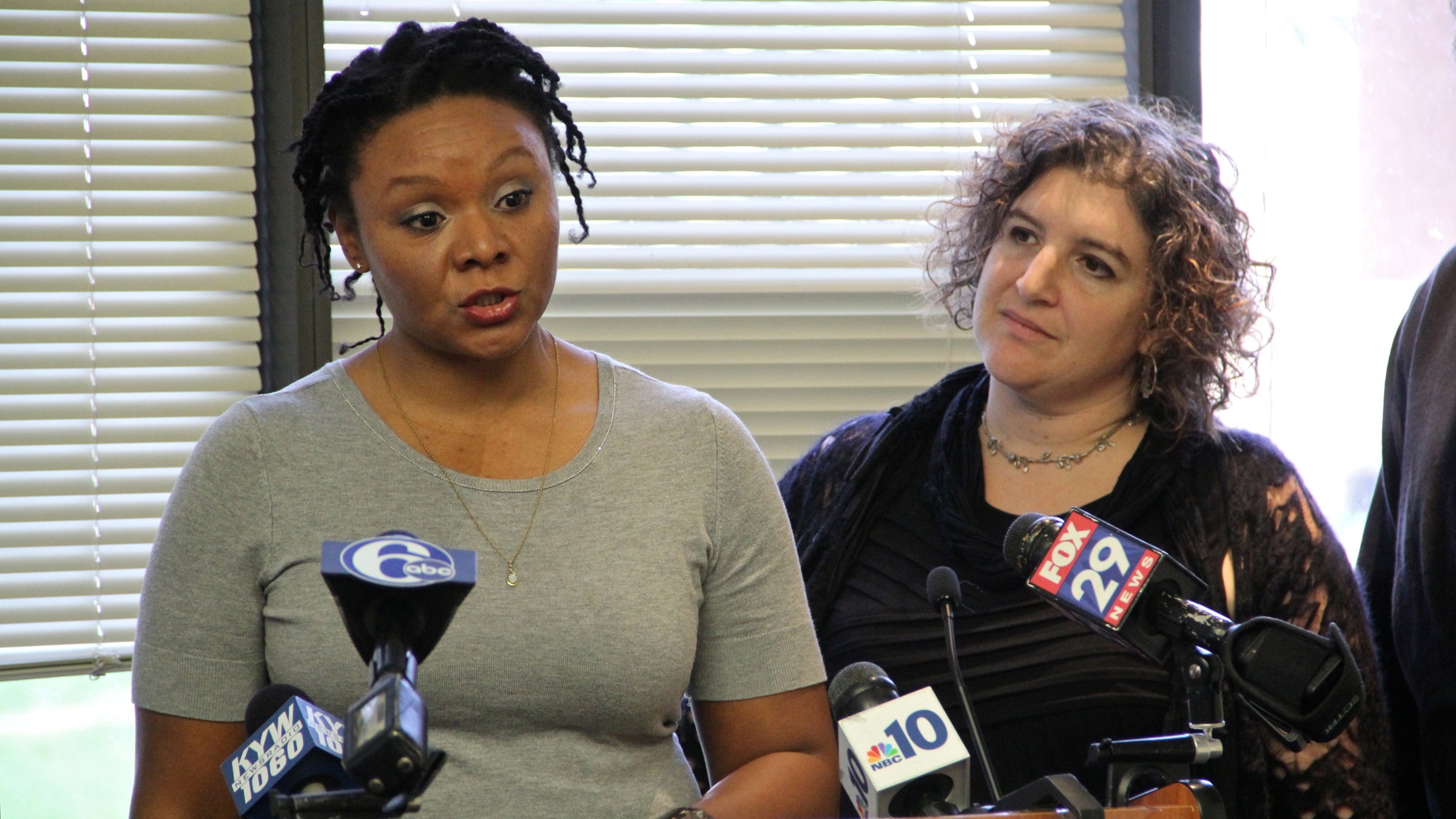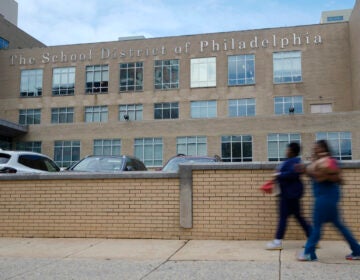Philly parents push state to intervene in four academically lacking schools

Robin Roberts (left), accompanied by Amy Laura Cahn of the Public Interest Law Center, talks about deficiencies in Philadelphia public schools that led her to file complaints. (Emma Lee/WHYY)
In what’s being celebrated as a major victory for parents, the Pennsylvania Department of Education has validated their claims of deficient curricula in four Philadelphia public schools. The department has ordered corrective action within 45 days.
After state budget cuts stripped schools of resources districtwide, academic programming was found lacking at Bodine High School of International Affairs; the Philadelphia High School for the Creative and Performing Arts; the Arts Academy at Benjamin Rush; and C.W. Henry Elementary.
The department’s ruling comes in response to 825 complaints filed in 2013 by parents from 75 schools through a coordinated effort organized by Parents United for Public Education.
Under the direction of former state education secretary Carolyn Dumaresq, an appointee of former Gov. Tom Corbett, the department did not investigate those claims.
In response to the inaction, seven parents along with Parents United filed a lawsuit against the department in 2014 with the help of the Public Interest Law Center.
Dumaresq had petitioned the Commonwealth Court to dismiss the case, claiming that the complaints were not curricular, and thus didn’t legally demand action.
The court ignored her request, compelling the department to investigate. Until this decision, the Law Center says only one other parent complaint has spurred state action.
This alone, parents and advocates count as a major victory.
“What we’re excited about today is that this provision, which has just been gathering dust, has actually been used,” said Ben Geffen, a staff attorney at the Law Center. “There’s been a trail blazed for other parents in Philadelphia or elsewhere in the state who have concerns that their local school district is not offering a proper curriculum.”
Although the lawsuit remains ongoing, the department – now under the leadership of Pedro Rivera, a Gov. Tom Wolf appointee – agrees that curricular deficiencies were present in four of the seven claims filed.
The state’s decision came by default because the district didn’t respond to the claims in a timely manner.
Bodine was found lacking in foreign language requirements; Rush Arts in art courses; Henry in gifted programming; and CAPA in physical education, writing and gifted.
“Parents across the commonwealth should continue to file complaints, knowing that [the education department] has now acknowledged its responsibility to take action,” said Helen Gym, City Councilwoman-elect and outgoing head of Parents United, in a statement.
The district has been ordered to create and implement corrective action plans, which the Law Center says will benefit all students at the four schools, not just those whose parents filed complaints.
“This is the only recourse we have as parents,” said Robin Roberts, who filed a claim based on a violation of her son’s legally enforceable gifted special education plan at Henry elementary. “Now we have something that’s binding.”
The Philadelphia School District said it will work with the department to address the deficiencies, but blamed its paltry academic offerings on state funding cuts.
“We informed parents for the last three years that there are insufficient resources for us to actually have the education programs in our schools that we really want,” said spokesman Fernando Gallard. “We actually have had the conversation about whether we can open schools on time.”
Last week, Philadelphia Superintendent William Hite said the district may not be able to pay employees or open schools beyond Jan. 29 if the state budget is not finalized.
Geffen agrees that the state bears the ultimate responsibility for ensuring that districts have the proper resources to provide a thorough and efficient education, but he believes the district could better prioritize academics within its fiscal constraints.
“If a school district has to make cuts, it’s not allowed to make cuts there,” he said.
The Philadelphia Federation of Teachers agreed.
“It is true that cuts to public education funding have played a huge role in resources available to our schools. But so too have misplaced priorities,” said PFT president Jerry Jordan in a statement. “Millions of dollars have gone toward other priorities, like expanding charter schools, or giving raises and bonuses to central office administrators.”
The district dismissed that view.
“There is no funding to prioritize,” said Gallard.
State law compelled the district to hear new charter school applicants last year for the first time since 2007. Under its reading of the law, the School Reform Commission must approve all applications that meet qualifications. Of 40 applicants last year, the SRC approved six.
The district currently seeks to convert three of its chronically low-performing charter schools to neighborhood-based charters, a proposal that does come with added costs.
The district recently gave two top level staffers $10,000 bonuses for taking on additional duties caused by vacancies, a move it says reflects a net cost savings.
The PFT criticizes that logic, citing the added, uncompensated burdens that teachers have assumed in recent years – including those due to the district’s so far disastrous decision to outsource substitute teachers.
WHYY is your source for fact-based, in-depth journalism and information. As a nonprofit organization, we rely on financial support from readers like you. Please give today.





